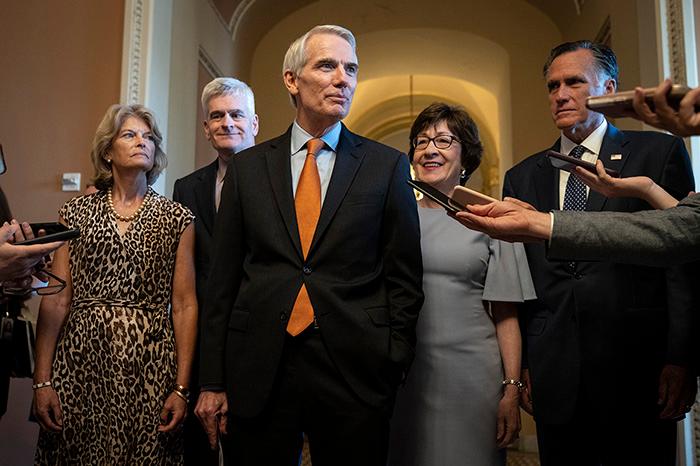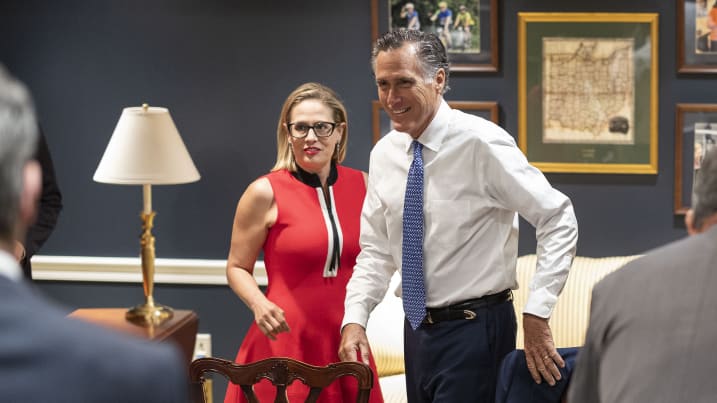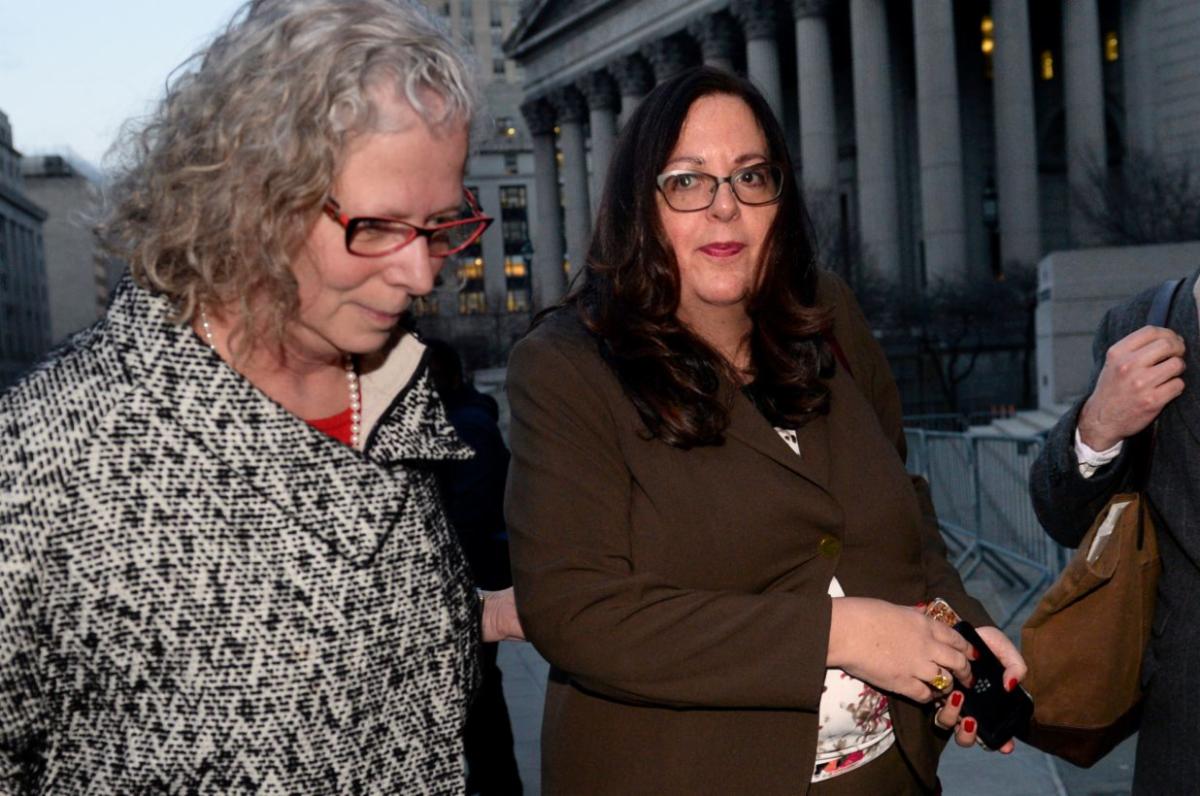Good Morning from Washington, D.C….
Last week, a bi-partisan group of Senators finally reached an agreement on the heretofore elusive bipartisan infrastructure framework (colloquially known as the “BIF” on the Hill) after seemingly endless discussion and negotiation. Soon afterward, the Senate voted 67-32 to take up the bill (with 17 Republicans voting in the affirmative). Negotiators cast the agreement–and vote–as proof that bipartisanship was still possible, even amidst Washington’s deep divisions. “Despite the popularity and the need for it, Washington hasn’t been able to get it done. This time, we’re going to get it done,” said Senator Rob Portman of Ohio, the lead GOP negotiator in the talks.
On Friday, despite a chaotic afternoon that included several different bill texts floating around, delays on the vote, and Republican concern that the Democratic Senate Majority Leader Chuck Schumer was trying to pull a “fast one” by substituting his own bill text for the BIF, a motion to proceed on the bill passed the Senate 66-28. Senators and staff finalized the 2,701 page bill over the weekend, and plan to hit the ground running on the amendment process today. Schumer said the Chamber would be ready to vote on the bipartisan bill “in a matter of days,” and detailed next steps, saying in floor remarks Sunday: “The process from here is simple…I will offer it as a substitute amendment, as I have always promised. And then the Senate can finally begin voting.” Republican and Democratic Senators alike echoed that optimism saying they hope to wrap up on votes by the end of this week. However, the House will not act on the bill until they return from their recess, meaning final passage of the bill will not come until September.
vote, and Republican concern that the Democratic Senate Majority Leader Chuck Schumer was trying to pull a “fast one” by substituting his own bill text for the BIF, a motion to proceed on the bill passed the Senate 66-28. Senators and staff finalized the 2,701 page bill over the weekend, and plan to hit the ground running on the amendment process today. Schumer said the Chamber would be ready to vote on the bipartisan bill “in a matter of days,” and detailed next steps, saying in floor remarks Sunday: “The process from here is simple…I will offer it as a substitute amendment, as I have always promised. And then the Senate can finally begin voting.” Republican and Democratic Senators alike echoed that optimism saying they hope to wrap up on votes by the end of this week. However, the House will not act on the bill until they return from their recess, meaning final passage of the bill will not come until September.
- Transportation
- $110 billion in new funds for road, bridges, and related projects;
- $39 billion for public transit—which the Biden administration described as “the largest federal investment in public transit in history;”
- $66 billion in rail;
- $42 billion on ports, airports, and related projects;
- $11 billion in “making America’s roads safer.”
- Reconnecting Neighborhoods
- While the bill does include $1 billion for reconnecting neighborhoods that have historically been disconnected from infrastructure, that number is significantly smaller than the $45 billion proposed by Biden in the American Jobs Plan.
- High-speed internet
- $65 billion with a goal of providing broadband internet to all Americans, another area of compromise—the American Jobs Plan had proposed—and Democrats were pushing for $100 billion.
- Climate Change & Environmental Remediation
- $73 billion from the Energy Infrastructure Act—including $28 billion on power grid infrastructure, resiliency, and reliability—and funding for supply chains for clean energy technology, and critical energy technologies like carbon capture, hydrogen, direct air capture, and energy efficiency;
- $7.5 billion into a national network of electric vehicle chargers and $7.5 billion toward electrifying buses and ferries;
- $46 billion to mitigate damage from floods, wildfires, and droughts;
- $55 billion on clean water infrastructure, particularly to eliminate lead pipes and other dangerous chemicals in today’s service lines;
- $21 billion on environmental remediation, particularly to clean up superfund and brownfield sites, abandoned mines, and orphaned gas wells.
While many in the Senate—including Democrat and key swing vote Senator Kyrsten Sinema of Arizona—are celebrating the bill, Progressives in the Senate and House say Democrats in the bipartisan group compromised far too much and that means the bill faces an uncertain path forward, as Democrats have only a three vote margin in the House. The plan, according to Democrats, is to tie the BIF to the much more ambitious $3.5 billion “antipoverty and healthcare” plan that Democrats are drafting to be moved through budget reconciliation. House Speaker Nancy Pelosi says she will not bring up the infrastructure package without the reconciliation bill, a stance demanded by progressives to ensure their priorities get done. Pelosi said, “We need to be transformative in terms of how we go forward with infrastructure investments and reconciliation bills that truly meet families’ needs.”
celebrating the bill, Progressives in the Senate and House say Democrats in the bipartisan group compromised far too much and that means the bill faces an uncertain path forward, as Democrats have only a three vote margin in the House. The plan, according to Democrats, is to tie the BIF to the much more ambitious $3.5 billion “antipoverty and healthcare” plan that Democrats are drafting to be moved through budget reconciliation. House Speaker Nancy Pelosi says she will not bring up the infrastructure package without the reconciliation bill, a stance demanded by progressives to ensure their priorities get done. Pelosi said, “We need to be transformative in terms of how we go forward with infrastructure investments and reconciliation bills that truly meet families’ needs.”
 accusations surrounding Cuomo, will resign from her post this week just as the Attorney General’s probe may be nearing its end. Mogul (on left in photo) has served as Special Counsel to the governor since 2019 and was one of the senior Cuomo aides who handled a sexual harassment complaint lodged by Charlotte Bennett, a former executive assistant to Cuomo. Her departure comes as the investigation, which is being led by two outside lawyers—Joon H. Kim, a former federal prosecutor, and Anne L. Clark, a prominent employment lawyer—may be entering its final phases. Investigators questioned Cuomo earlier this month after having interrogated many of his closest aides and allies. They are expected to publish their findings in a public report in the coming weeks. Meanwhile, another Cuomo accuser offered to take a lie-detector test and challenged Cuomo to do the same. The report, whatever it concludes, will be the true kick-off of the 2022 election season in New York.
accusations surrounding Cuomo, will resign from her post this week just as the Attorney General’s probe may be nearing its end. Mogul (on left in photo) has served as Special Counsel to the governor since 2019 and was one of the senior Cuomo aides who handled a sexual harassment complaint lodged by Charlotte Bennett, a former executive assistant to Cuomo. Her departure comes as the investigation, which is being led by two outside lawyers—Joon H. Kim, a former federal prosecutor, and Anne L. Clark, a prominent employment lawyer—may be entering its final phases. Investigators questioned Cuomo earlier this month after having interrogated many of his closest aides and allies. They are expected to publish their findings in a public report in the coming weeks. Meanwhile, another Cuomo accuser offered to take a lie-detector test and challenged Cuomo to do the same. The report, whatever it concludes, will be the true kick-off of the 2022 election season in New York.FOR DAILY UPDATES, FOLLOW US:
Client News
Greenlight Locations in Rochester NY to Expand in Second Half of 2021
Greenlight serves about 58,000 customers, and is aiming to reach 75,000 by year end in 14 municipalities across the Greater Rochester, Binghamton and Buffalo areas. [Read more.]
The Working Families Party’s Amazing Disappearing Ballot Line
In an unprecedented and little-noted ruling earlier this month, almost every Democrat running on the Working Families Party (WFP) line in New York City was thrown off the November ballot by the city’s Board of Elections. What happened exactly? [Read more.]
What It Looks Like to Reconnect Black Communities Torn Apart by Highways
Take any major American city and you’re likely to find a historically Black neighborhood demolished, gashed in two, or cut off from the rest of the city by a highway. This legacy of racist federal transportation policies continues to define the landscapes of urban spaces. [Read more.]
How The Olympic Medal Table Explains The World
Imagine a Martian trying to make sense of this world, and the only available data are the Summer Olympic medal tables from the past century. How much would that explain? Quite a lot, it turns out. [Read more]




